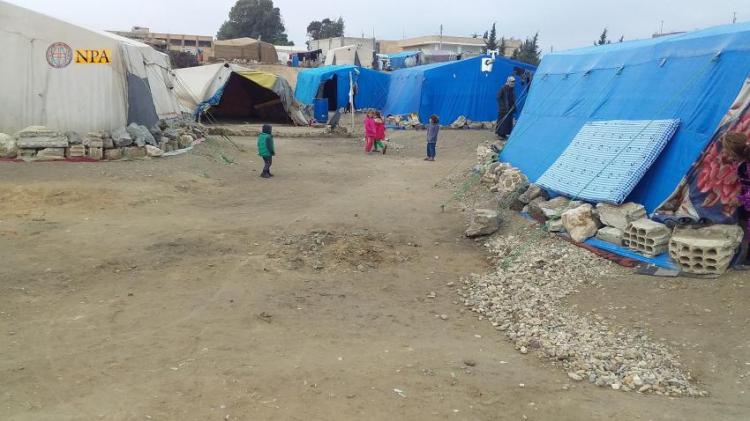Gypsies in northern Syria retract in the decorated tents away from the war parties
Raqqa- North-Press Agency
Mustafa al-Khalil
They are cautious, and proud of their origins despite all disrespect they endure from the Syrian society. They boast that they are different from everyone, they did not consider themselves as a part in the Syrian war, rather, they preferred to retract into their decorated tents away from the war's horrors. However, this did not avoid them the effects of a long-term fierce blind war, in a country where everyone has had a share. Some of them lost their sons and others’ homes were destroyed, and they were forced to leave their areas. Their situation is no different from the rest of the Syrians, they are the Gypsies.
The label
“They called us Gypsies, because of our ceaseless moving,” as Muhammad Yasser, 50 years old, explained the origin and meaning of the word, to North-Press. Yasser is from al-Eshreen Street in al-Ashrafieh neighborhood; one of the oldest neighborhoods in Aleppo. 9 years ago, Yasser and his family lived in a camp located at the eastern part of the village of Ratla, 12km southeast of Raqqa. Yasser pointed out that before the Syrian war that affected them a lot, they were residing in the neighborhoods of Aleppo, especially in al-Ashrafieh neighborhood, noting that today they are distributed in many Syrian cities and regions.
While Rida al-Hassan, a displaced young man from Aleppo and lives in the camp of Ratla, expressed his proudness of being a "Gypsy". “Some people look down at us, especially the Arabs, knowing that we are of Arab descents," he said. Al-Hassan insists on what Muhammad Yasir said, that the reason for naming came from their residence in tents.
Rida complained about the mechanism of the civil society organizations which operate in Raqqa, as what they have given them is very little. "They provide the people of the village with assistance, and give us nothing; they just register our statistics," Rida said.
"Some say to them that they do not need support because they have a financial income from the profession of dentistry, knowing that there is no water nor toilets in this camp," Rida added referring to the people of Ratla village.
Dental prostheses
The circumstances of the war forced Hassan Abdullah, 21, to move from Sheikh Maqsoud Gharbi in Aleppo to live with his family in a camp, east of the village of Ratla, some 11 years ago. Hassan learned dental prostheses at the hands of his father, in turn the father acquired it from his family, who inherits this profession generation after another 400 years ago. Hassan said that some people turn to him for dental prostheses and treatment, due to the high wages of dentists, and the high costs of living, especially after the war, which led to the rise of the dollar.
Moreover, Jamal Al-Sayegh, 60, from al-Ashrafieh neighborhood in Aleppo, speaking in a tone of anger as he was asked about the descendant of gypsies in Syria, "we are Syrians," he said. Jamal refutes all the stories that say the gypsies of Syria are originally from Pakistan, by saying: "This is not true; we were born and lived in Aleppo, and our people and grandparents lived and died in Aleppo."
"We only know the profession of dental prostheses, which we are distinguished for," Jamal said, noting that women work "by selling some simple tools such as gums, needles and mirrors, some of them work in the (begging)," he added.

